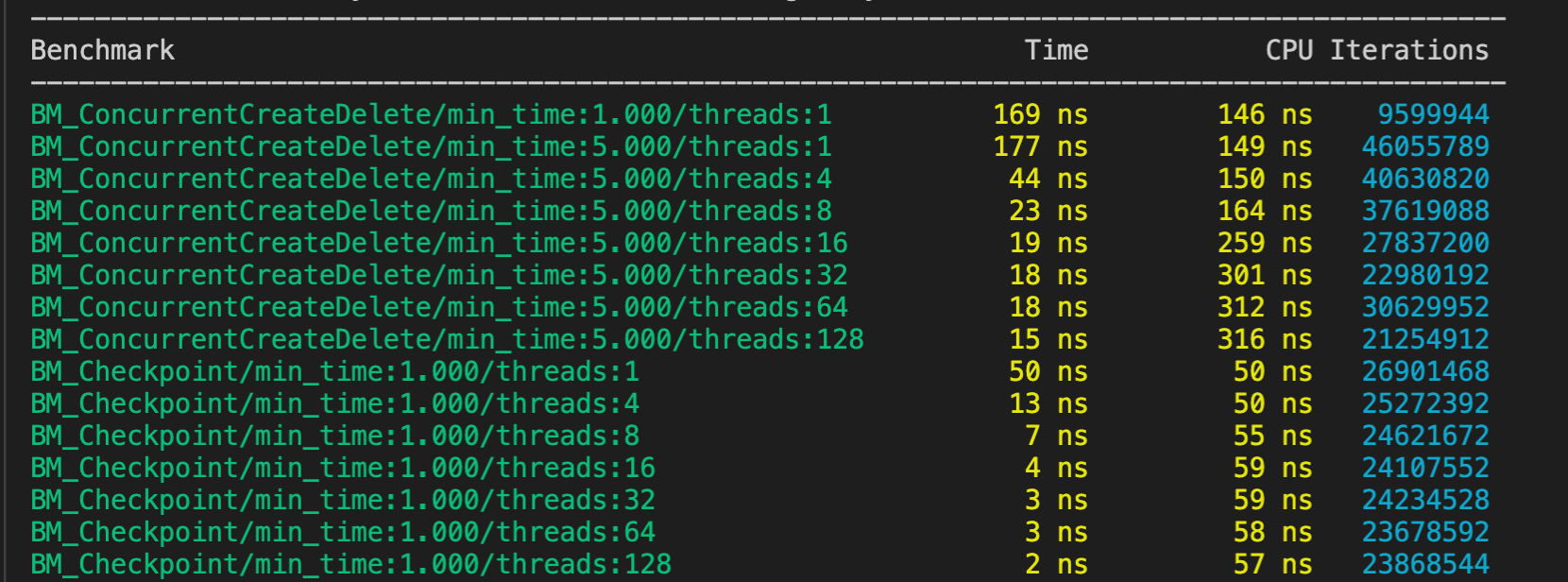TLM is production ready C++ library designed to detect deadlocks, livelocks and starvation at runtime with tiny overhead. The project is sponsored and copyrighted by MongoDB.com, author Andrew Shuvalov.
#include "thread_monitor/thread_monitor.h"
void myLivelockedMethod();
void myParentMethod() {
thread_monitor::ThreadMonitor<> monitor("Livelock demo", 1);
std::this_thread::sleep_for(2ms);
thread_monitor::threadMonitorCheckpoint(2);
myLivelockedMethod();
}
void myLivelockedMethod() {
thread_monitor::threadMonitorCheckpoint(3);
while (true) {
std::this_thread::sleep_for(1ms);
}
}
After the timeout configured with ThreadMonitorCentralRepository::setThreadTimeout() expires the library will dump the checkpoint history for the stuck thread and then for all other instrumented threads that are stuck for more than 1 millis (to reduce verbosity):
Frozen thread: Livelock demo id: 140085845083904
Checkpoint: 1 at: 2021-12-09 23:29:36.201542 delta: 0 us
Checkpoint: 2 at: 2021-12-09 23:29:36.203625 delta: 2083 us
and then it will invoke the callback registered with ThreadMonitorCentralRepository::setLivenessErrorConditionDetectedCallback(). Most likely, you would like to terminate your program when this callback is called.
- Note: if you add a
threadMonitorCheckpoint()inside thewhile()loop above, the thread will be considered alive and the liveness error will not be triggered.
- first group is registration/derigistration pair, second group is checkpoints
More detailed benchmarks and optimizations.
ThreadMonitor class to be instantiated on stack, registers itself with singleton of ThreadMonitorCentralRepository and with thread local pointer to itself. In the destructor, ~ThreadMonitor() sets the thread local pointer to nullptr and marks itself as deleted at the ThreadMonitorCentralRepository.
The TLM requires an explicit instrumentation of threads with global method threadMonitorCheckpoint(). Each time this method is invoked, it updates the
liveness timer for the current thread. The method is using the thread local pointer to locate the ThreadMonitor, thus it is impossible to update the liveness of another thread.
ThreadMonitor must be always deleted by the same thread which created it, otherwise it will be unable to deregister itself and memory corruption will happen.
Some of the configuration parameters could be changed on the ThreadMonitorCentralRepository singleton. It is not necessary as the defaults
are reasonable.
ThreadMonitor keeps a circular buffer history of the past visited checkpoints.
The count of checkpoints stored is the class template parameter. The ThreadMonitor updates the stale timestamp in the central repository as well.
This timestamp is stale because it is updated only as often as configured, for the
performance reasons.
It is possible to instantiate the ThreadMonitor more than once in the same thread. Only the 1st instance will have any effect. This is supported for the reason the call tree could be complex and preventing duplicate instantiations could be cumbersome.
- reporting interval: how often a thread should update its timestamp in the central repository. The default value of 1 ms should be good for most cases
- monitoring interval: how often the central repository monitoring and garbage
collection cycle should run. It should be reasonably often because the deregistered
ThreadMonitorinstances may accumulate and waste memory. The default value is set to run it relatively often for those cases when there is a significant churn ofThreadMonitorinstances. The monitor cycle is measured to take about 1 micros, so it's not a lot of overhead - thread timeout: sets how long the thread should be stale before it is considered not live anymore (frozen, deadlocked), which triggers the fault procedures. The default value of 5 minutes is recommended for production
- liveness error condition callback: a callback that will be invoked once the liveness error is detected. It is recommended to terminate the server when it happens
